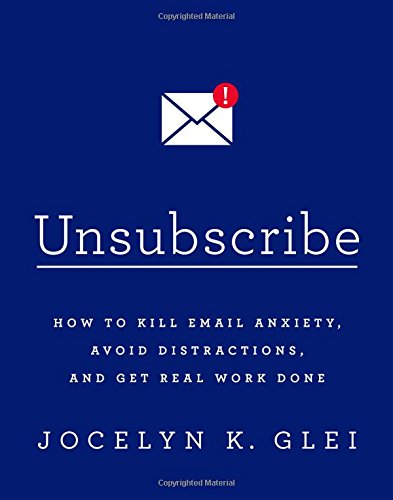 I like to think that I am fairly on top of and organized when it comes to keeping track of my email. However, I've always had the problem that Jocelyn Glei discusses in her forthcoming book Unsubscribe: How to Kill Email Anxiety, Avoid Distractions, and Get Real Work Done; similar to studies done with rats pulling a lever to get a pellet, I have relied too much on email to deliver a dopamine jackpot. Most likely the email will be a Google alert or another newsletter from that flower company I ordered from that one time, but maybe this one time it will be a great email from somebody I haven't heard from in a long time, or a client offering me a great high-profile gig for very little effort.Â
I like to think that I am fairly on top of and organized when it comes to keeping track of my email. However, I've always had the problem that Jocelyn Glei discusses in her forthcoming book Unsubscribe: How to Kill Email Anxiety, Avoid Distractions, and Get Real Work Done; similar to studies done with rats pulling a lever to get a pellet, I have relied too much on email to deliver a dopamine jackpot. Most likely the email will be a Google alert or another newsletter from that flower company I ordered from that one time, but maybe this one time it will be a great email from somebody I haven't heard from in a long time, or a client offering me a great high-profile gig for very little effort.Â
Glei's book came my way by a nice instance of serendipity. I reached out to her in hopes of interviewing her for a story I'm working on--we decided she wasn't the right person for my piece, but she still kindly offered to send me her book. I read it over a weekend and came away excited to try some new methods she suggests in order to feel more in charge of my email, not just in terms of letting it suck up so much of my time but not letting it suck up so much of my mental energy. I know often with how-to books I just skip to the bullet points but Glei very nicely breaks down the various reasons why we feel like email is in charge of us, which gave me some food for thought.
Here's what I am trying:
- Don't check email first thing in the morning. Instead, don't look at email until I've devoted at least 60 minutes to meaningful work, which I defined in a short list of the goals I want to achieve over the next several months.
- Schedule 1-2 times a day to check email for 30-60 minutes. Treat those times as "meetings" I show up at. I hope that this will encourage me to turn email off in the background and to set a time limit for responding to emails.
- Let go of the idea of "inbox zero" because it's a moving target. There is nothing preventing 20 new emails from rolling in after I've just responded to 40. In fact it's fine to just not respond to emails right away--or at all.
- Employ hacks in the form of Gmail mute, Inbox pause, and Unroll.me in order to cut down the number of emails that trickle in one at a time, quiet down long email strings, and temporarily stop new emails from showing up while I'm addressing what's in my inbox.
- Create my own "status bar" for the end of the day so I can feel the appropriate sense of achievement for the dozens of small achievements I pull off per day. Yeah, today I'm stressing out about a new part-time job I'm taking on and two deadlines I have on Friday but I'm also going to take a second to appreciate that I met a deadline, sent off a bunch of pitches, conducted an important interview, exercised, got some sort of food on the table, and am writing this blog post.
Of course, all these plans can't hack the unexpected, which is exactly what happened Monday -- nobody cares less for your work plans than your children. James came down with a fever and I needed to go and pick him up at daycare and then rock him until Steve got home to take over. So, so much for my beautiful streamlined plan to be more in charge of my time. But still--I got the first bullet point met, which was great because I was much closer to meeting one of my deadlines when I got the sick baby home than I would have been had I stuck with my previous emailing practice.
So anyway I would check out Glei's book if you also feel unsatisfied with your current relationship with email. It's a quick and enjoyable read (this might be a weird thing to praise but I appreciate how frequently she refers to the things we have to get done as "shit"--we all have shit to do, for better or for worse.) And if you don't hear from me as quickly as you're used to, I'm just being in charge of my email.
